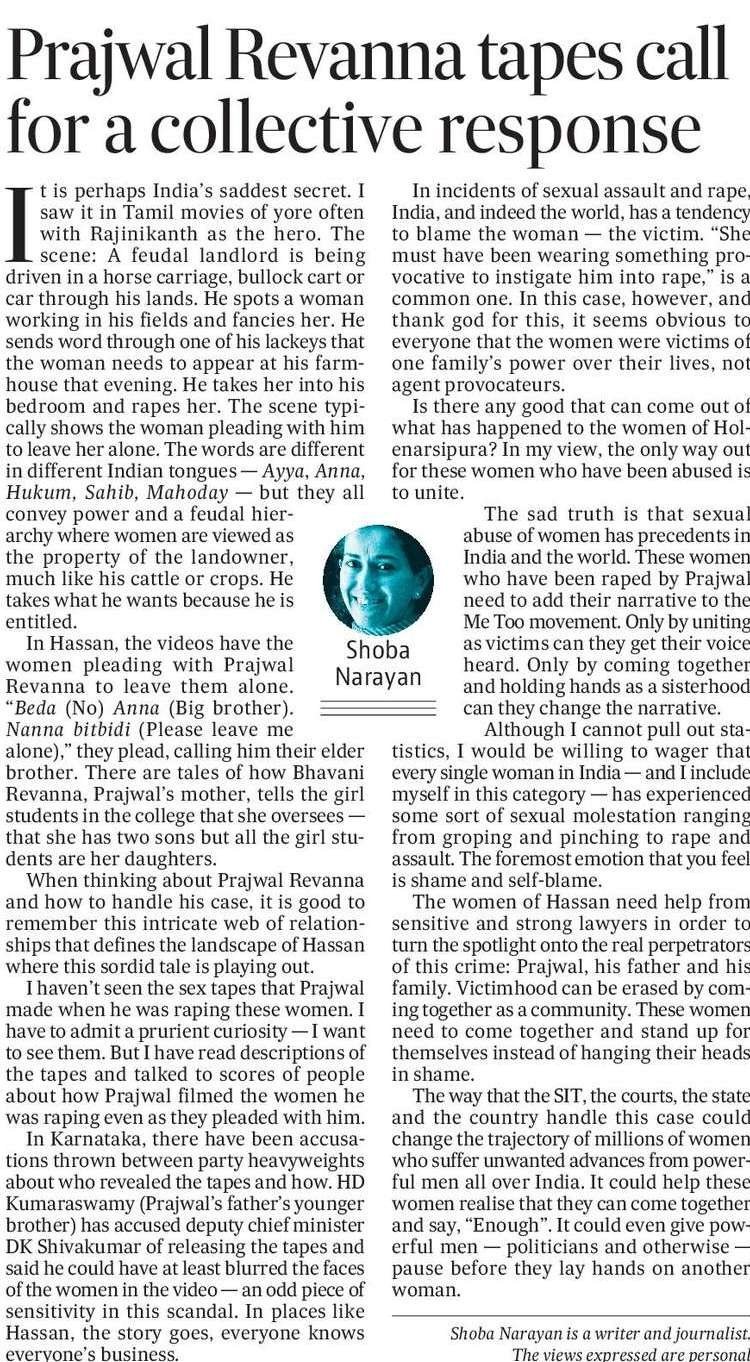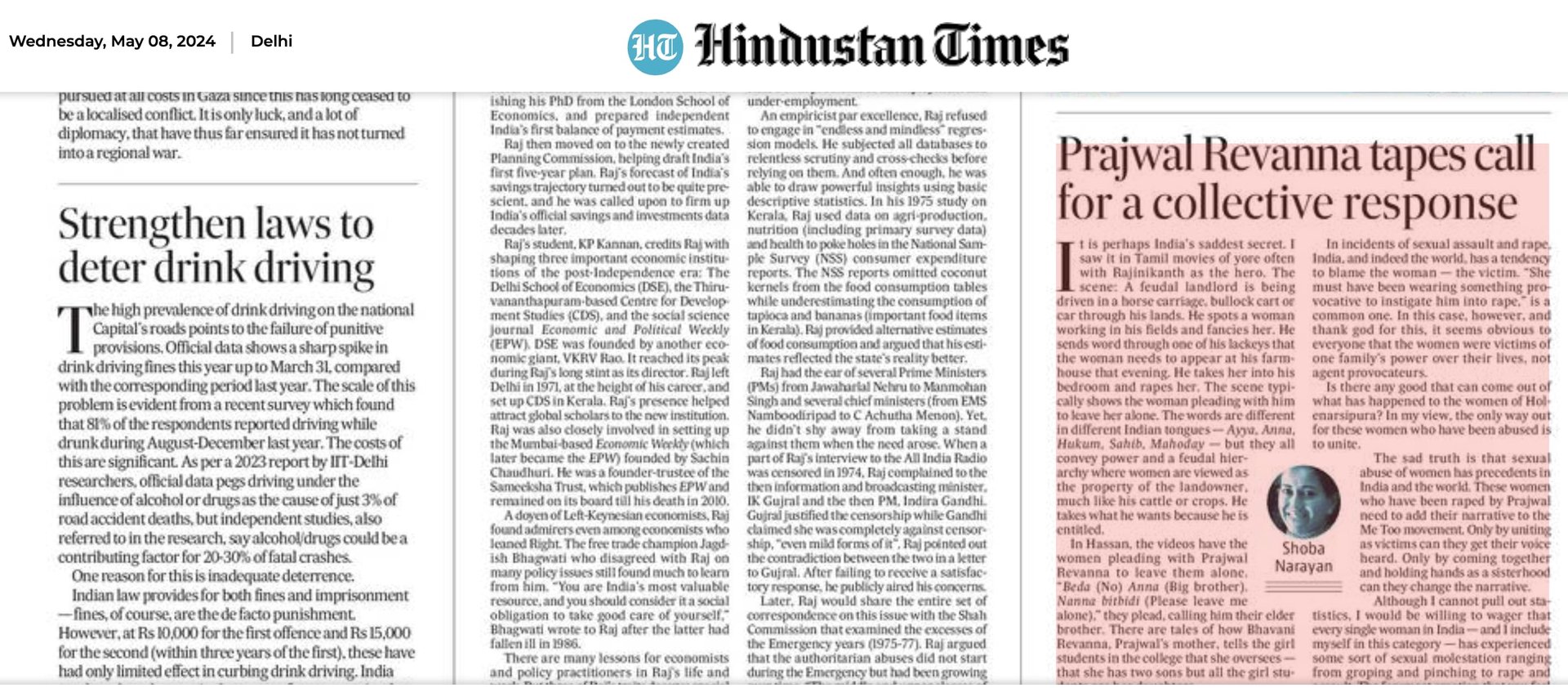It is perhaps India’s saddest secret. I saw it in Tamil movies of yore often with Rajinikanth as the hero. The scene: a feudal landlord is being driven in a horse-carriage or bullock cart or car through his lands. He spots a woman working in his fields and fancies her. He sends word through one of his lackeys that the woman needs to appear at his farmhouse that evening. He takes her into his bedroom and rapes her. The scene typically shows the woman pleading with him to leave her alone. The words are different in different Indian tongues —Ayya, Anna, Hukum, Sahib, Mahoday—but they all convey power and a feudal hierarchy where women are viewed as the property of the landowner, much like his cattle or crops. He takes what he wants because he is entitled.
In Hassan, the videos have the women pleading with Prajwal Revanna to leave them alone. “Beda (No) Anna (Big brother). Nanna bitbidi (Please leave me alone),” they plead, calling him their elder brother. There are tales of how Bhavani Revanna, Prajwal’s mother, tells the girl students in the college that she oversees– that she has two sons but all the girl-students are her daughters.
When thinking about Prajwal Revanna and how to handle his case, it is good to remember this intricate web of relationships that defines the landscape of Hassan where this sordid tale is playing out.
I haven’t seen the sex tapes that Prajwal made when he was raping these women. I have to admit a prurient curiosity—I want to see them. But I have read descriptions of the tapes and talked to scores of people about how Prajwal filmed the women he was raping even as they pleaded with him. A journalist friend describes one incident where the woman appears to be a traffic constable. She arrives in his office, is asked to undress, and then Prajwal turns the camera on her as she lies in bed while he rapes her.
In Karnataka, there have been accusations thrown between party heavyweights about who revealed the tapes and how. H. D. Kumaraswamy (Prajwal’s father’s younger brother) has accused deputy chief minister D. K. Shivakumar of releasing the tapes and said that he could have at least blurred the faces of the women in the video—an odd piece of sensitivity in this scandal. In places like Hassan, the story goes, everyone knows everyone’s business.
In incidents of sexual assault and rape, India and indeed the world, has a tendency to blame the woman—the victim. “She must have been wearing something provocative to instigate him into rape,” is a common one. In this case however, and thank god for this, it seems obvious to everyone that the women were victims of one family’s power over their lives, not agent provocateurs.
Is there any good that can come out of what has happened to the women of Holenarsipura? In my view, the only way out for these women who have been abused is to unite. The sad truth is that sexual abuse of women has precedence in India and the world. These women who have been raped by Prajwal need to add their narrative to the Me-Too movement. Only by uniting as victims can they get their voice heard. Only by coming together and holding hands as a sisterhood can they change the narrative.
Although I cannot pull out statistics, I would be willing to wager that every single woman in India—and I include myself in this category– has experienced some sort of sexual molestation ranging from groping and pinching to rape and assault. The foremost emotion that you feel is shame and self-blame.
The women of Hassan need help from sensitive and strong lawyers in order to turn the spotlight onto the real perpetrators of this crime: Prajwal, his father and his family. Victimhood can be erased by coming together as a community. These women need to come together and stand up for themselves instead of hanging their heads in shame.
The way that the SIT, the courts, the state and the country handles this case could change the trajectory of millions of women who suffer unwanted advances from powerful men all over India. It could help these women realise that they can come together and say, “Enough.”
It could even give powerful men—politicians and otherwise—pause before they lay hands on another woman.
Shoba Narayan is Bangalore-based award-winning author. She is also a freelance contributor who writes about art, food, fashion and travel for a number of publications.



-k4lD-U204025897261YmH-250x250%40HT-Web.jpg)




Leave A Comment